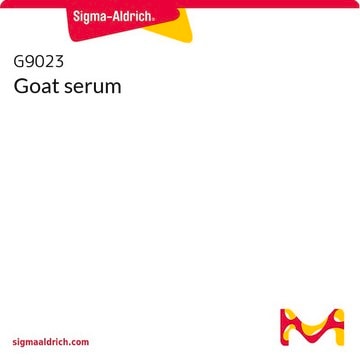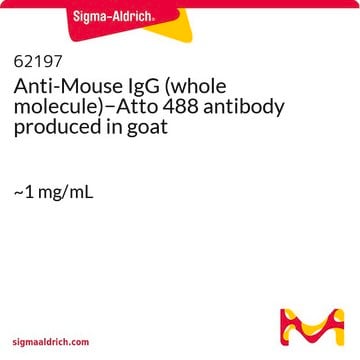SAB4600042
Anti-Mouse IgG (H+L), CF™ 488A antibody produced in goat
~2 mg/mL, affinity isolated antibody
About This Item
Productos recomendados
biological source
goat
Quality Level
conjugate
CF™ 488A conjugate
antibody form
affinity isolated antibody
antibody product type
secondary antibodies
clone
polyclonal
form
buffered aqueous solution
species reactivity
mouse
concentration
~2 mg/mL
technique(s)
flow cytometry: 1-10 μg/mL
immunocytochemistry: suitable
immunohistochemistry: suitable
indirect immunofluorescence: 1-10 μg/mL
fluorescence
λex 490 nm; λem 515 nm
shipped in
dry ice
storage temp.
−20°C
target post-translational modification
unmodified
General description
Specificity
Immunogen
Application
Flow cytometry/Cell sorting (1 paper)
Biochem/physiol Actions
Features and Benefits
Physical form
Preparation Note
Legal Information
Disclaimer
¿No encuentra el producto adecuado?
Pruebe nuestro Herramienta de selección de productos.
Storage Class
10 - Combustible liquids
wgk_germany
WGK 2
Certificados de análisis (COA)
Busque Certificados de análisis (COA) introduciendo el número de lote del producto. Los números de lote se encuentran en la etiqueta del producto después de las palabras «Lot» o «Batch»
¿Ya tiene este producto?
Encuentre la documentación para los productos que ha comprado recientemente en la Biblioteca de documentos.
Los clientes también vieron
Nuestro equipo de científicos tiene experiencia en todas las áreas de investigación: Ciencias de la vida, Ciencia de los materiales, Síntesis química, Cromatografía, Analítica y muchas otras.
Póngase en contacto con el Servicio técnico





